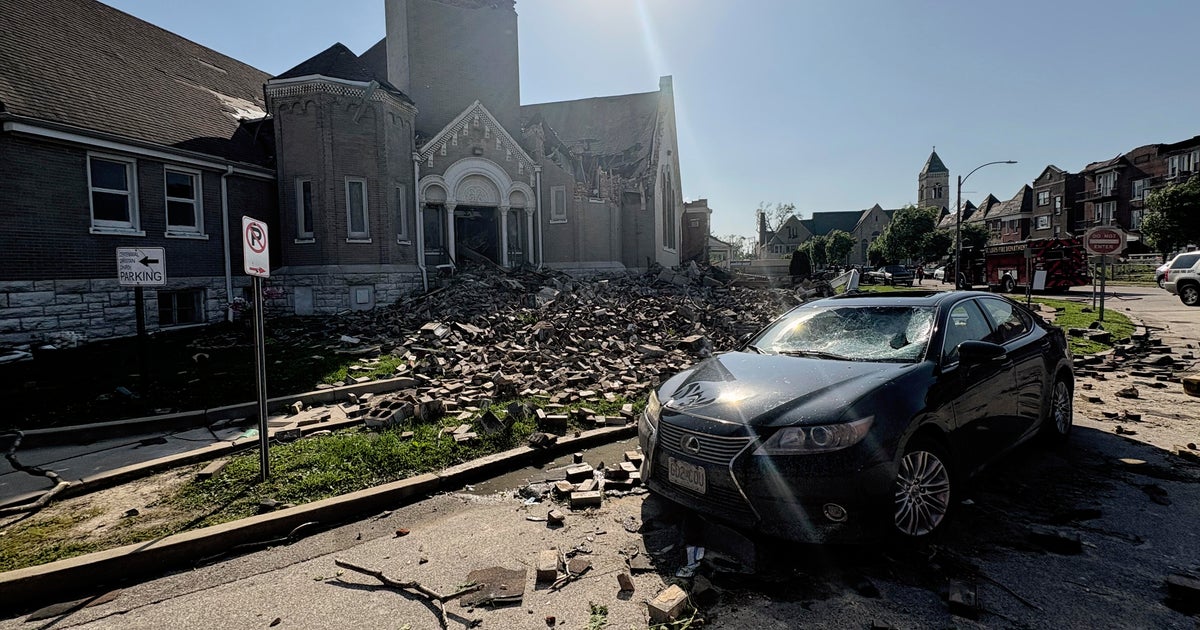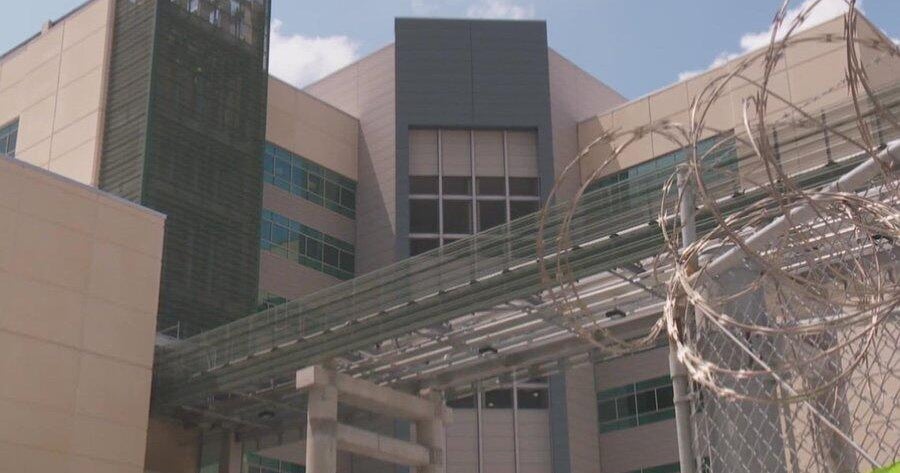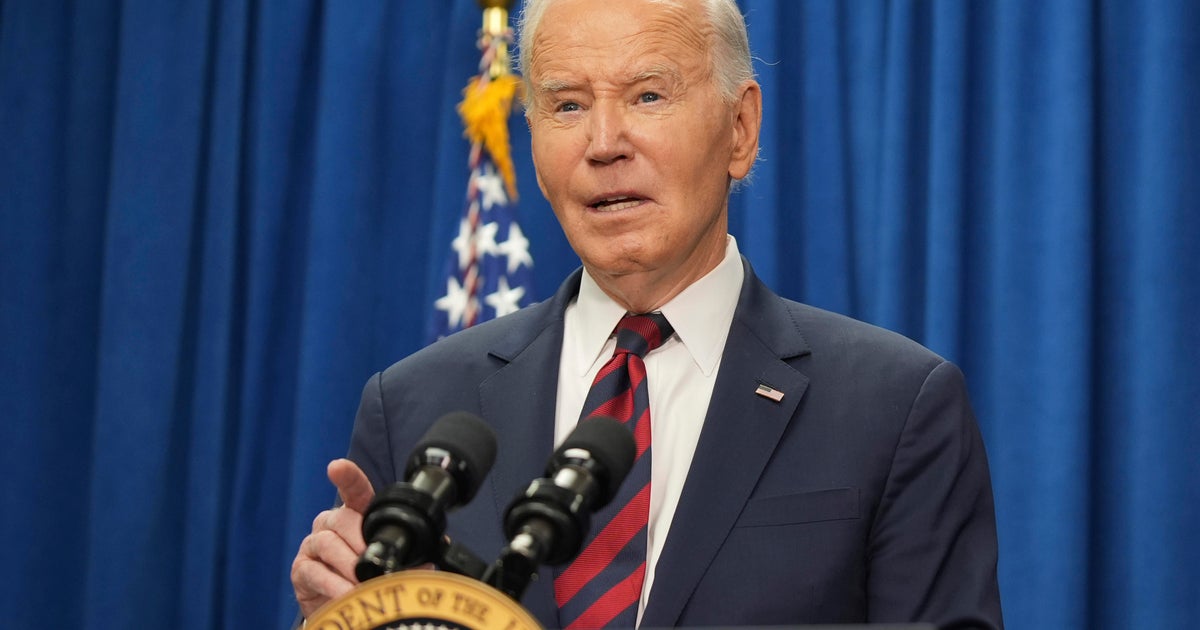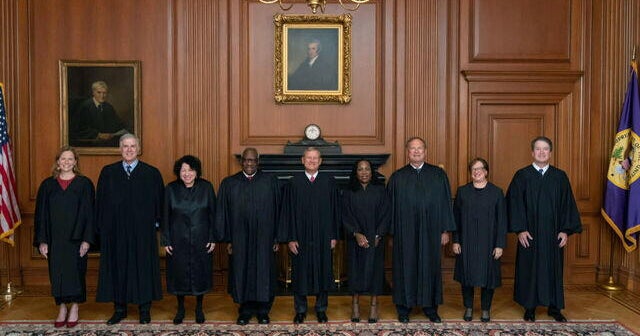Washington — The Supreme Court on Friday said it will continue to block the Trump administration from deporting Venezuelan men detained in northern Texas while they pursue a challenge to their removals under the wartime Alien Enemies Act.
The order from the high court grants an emergency injunction sought by lawyers for a group of Venezuelan migrants who they said faced "imminent" risk of removal under President Trump's March proclamation invoking the Alien Enemies Act of 1798. It maintains an early directive issued by the Supreme Court last month that temporarily prohibited the government from removing the Venezuelan migrants held at the Bluebonnet Detention Facility in Anson, Texas, under the 18th-century law.
The Supreme Court's April order, issued overnight, blocked the deportations "until further order of this court."
Friday's order was unsigned, and two justices dissented: Samuel Alito and Clarence Thomas.
The order said the Fifth Circuit Court of Appeals was wrong to dismiss the detainees' appeal over lack of jurisdiction, vacating its judgement and remanding the case back to the court for further proceedings.
The high court also said the plaintiffs in the case didn't receive enough notice to challenge their deportations under the Alien Enemies Act in court, pointing to the Trump administration's stated plan earlier in the case to deport them within about a day. But the justices did not specify exactly what kind of notice possible deportees should be granted, and said the Fifth Circuit should address that question.
"To be clear, we decide today only that the detainees are entitled to more notice than was given on April 18," the order read.
The high court did not address whether the Trump administration has the legal right to deport Venezuelans under the Alien Enemies Act.
"We recognize the significance of the Government's national security interests as well as the necessity that such interests be pursued in a manner consistent with the Constitution. In light of the foregoing, lower courts should address AEA cases expeditiously," the court said.
The emergency appeal to the Supreme Court came in a fast-moving dispute that intensified after the American Civil Liberties Union said last month that it learned Venezuelan migrants being held at the facility in Anson had received notices informing them that they were subject to removal under the Alien Enemies Act. The ACLU said that the notices classified the migrants as members of the Venezuelan gang Tren de Aragua who must be removed from the U.S., and the men were informed they may be deported within hours.
Lawyers for the Venezuelan migrants said that the Trump administration's actions violated the Supreme Court's early April decision in a different case involving removals under the Alien Enemies Act. In that ruling, the high court said migrants subject to removal under the 1798 law must receive notice that they faced deportation "within a reasonable time" and be allowed to bring habeas claims to challenge their removals.
The Supreme Court's earlier decision also said judicial relief had to be sought in the district where the migrants are being held, which led the ACLU to file petitions in New York, southern Texas and Colorado on behalf of Venezuelan migrants who faced deportation under the Alien Enemies Act. The three judges overseeing those cases agreed to temporarily block the Trump administration from using the wartime authority to deport migrants in custody within their districts.
On May 1, the judge in southern Texas permanently blocked the Trump administration from using the Alien Enemies Act to deport Venezuelan migrants living or detained in the district, finding that the president's proclamation exceeded the scope of the law and was contrary to its terms.
The ACLU had asked U.S. District Judge James Wesley Hendrix of the Northern District of Texas to block the "imminent" removal of Venezuelan migrants detained at the Bluebonnet facility in Anson without adequate notice. The group alleged the Trump administration moved Venezuelan men from detention centers in Louisiana, Minnesota and California to Anson "without meaningful explanation." The government also hadn't indicated the type of notice it planned to provide those covered by Mr. Trump's Alien Enemies Act proclamation or how much time it would give them before deporting them to El Salvador or another country, according to the ACLU.
But Hendrix declined to issue temporary relief, finding two Venezuelan men detained in northern Texas who risked deportation under the Alien Enemies Act were not in impending danger of removal. A second federal judge in Washington, D.C., also refused to intervene in an 11th-hour bid by the ACLU to more broadly block the removals.
After Hendrix declined the temporary restraining order, the ACLU said in court papers that the government gave detainees the notices, in English only, designating them for removal under the Alien Enemies Act. The ACLU also said officials told the men they would be removed within 24 hours.
The group then sought relief simultaneously from the U.S. Court of Appeals for the 5th Circuit and the Supreme Court.
The ACLU argued that the government's actions do not give Venezuelan migrants in northern Texas who are at risk of removal under the Alien Enemies Act a "realistic opportunity" to pursue judicial relief and warned that without intervention, dozens or hundreds of Venezuelan men were at risk at being removed to a notorious prison in El Salvador, where they would have no chance to contest their designation as an "alien enemy" or their removal.
"The public has a critical interest in preventing wrongful removals, especially where it could mean a lifetime sentence in a notorious foreign prison," they wrote.
But the Trump administration said the ACLU's request for an injunction is "unprecedented," and argued it is too early for the Supreme Court to intervene. Solicitor General John Sauer told the court in a filing that the government had agreed not to use the Alien Enemies Act to remove detainees who have filed habeas petitions.
Signed last month, the president's proclamation invoking the Alien Enemies Act has already sparked significant clashes with the federal courts. The 1798 law has been used only three times before, and each time during a period of war.
Mr. Trump's proclamation provides that all Venezuelan nationals ages 14 and older who are members of Tren de Aragua and are not U.S. citizens or legal permanent residents are subject to swift apprehension and removal as alien enemies. The president claimed that migrants with alleged ties to the gang were invading or staging an incursion into the U.S.
Shortly after the proclamation was signed in mid-March, the administration used the Alien Enemies Act to remove more than 100 Venezuelans to El Salvador, where they have been detained at its Terrorism Confinement Center, known as CECOT.
Mr. Trump's efforts to deport the Venezuelan migrants using the authority set off a legal battle in Washington, D.C. The judge overseeing that case, U.S. District Judge James Boasberg, found probable cause to hold the Trump administration in criminal contempt over what he said was its defiance of an order involving the removals of Venezuelan migrants to El Salvador.
The case that gave rise to that extraordinary order landed before the Supreme Court in late March. The high court divided 5-4 in finding that Mr. Trump could carry out deportations under the Alien Enemies Act, but unanimously agreed that judicial review must be available to people subject to removal under the law.
Several lower court judges have ruled against the Trump administration's use of the Alien Enemies Act — but on Tuesday, a Pennsylvania judge became the first to rule that Mr. Trump can use the wartime law to remove alleged Tren de Aragua members.
More from CBS News
Melissa Quinn






